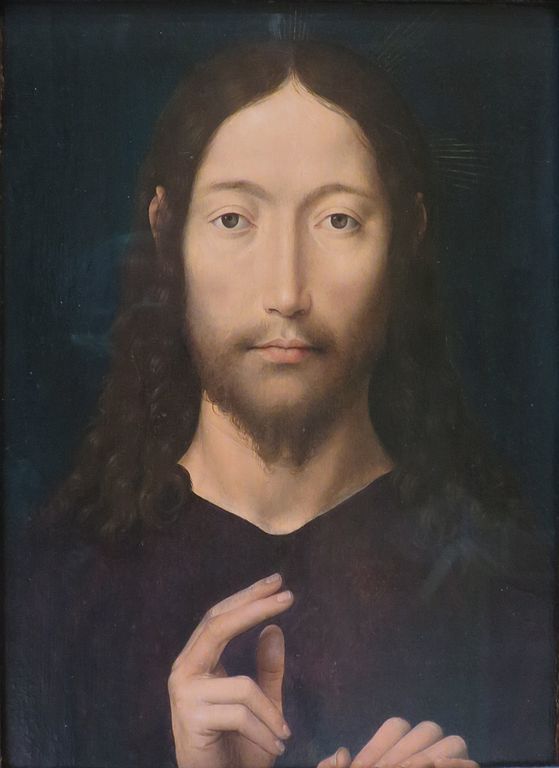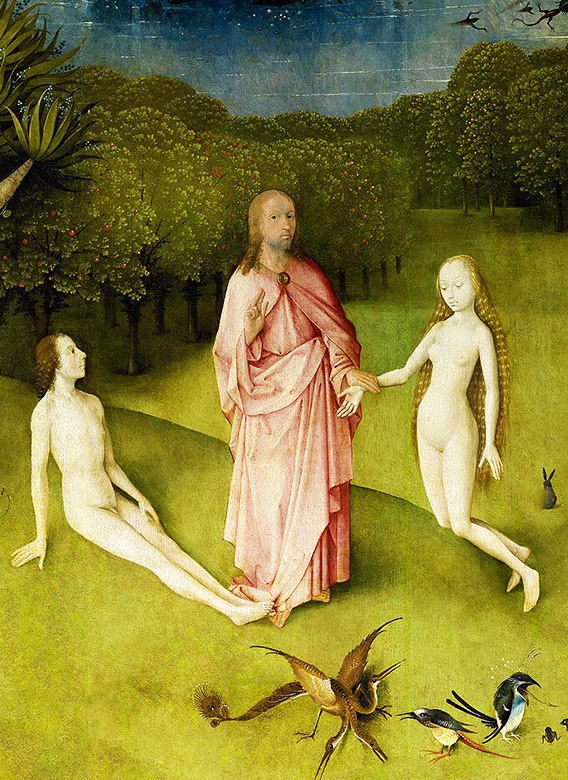Difference between revisions of "Jesus Christ"
Occultwiki (talk | contribs) |
Occultwiki (talk | contribs) |
||
| (5 intermediate revisions by the same user not shown) | |||
| Line 1: | Line 1: | ||
[[File:Christ Giving His Blessing.jpg|300px|thumb|Painting ''Christ Giving His Blessing'' by Hans Memlinc]] | [[File:Christ Giving His Blessing.jpg|300px|thumb|Painting ''Christ Giving His Blessing'' by Hans Memlinc]] | ||
'''Jesus Christ''' (c. 4 BC – AD 30 / 33), also referred to as '''Jesus of Nazareth''' or '''Jesus Christ''', was a first-century [[Judaism|Jewish]] preacher and religious leader. He is the central figure of [[Christianity]], the world's largest religion. Most Christians believe he is the incarnation of [[Yahweh|God]] the Son and the awaited messiah (the Christ), prophesied in the Hebrew [[Bible]]. | '''Jesus Christ''' (c. 4 BC – AD 30 / 33), also referred to as '''Jesus of Nazareth''' or '''Jesus Christ''', was a first-century [[Judaism|Jewish]] preacher and religious leader. He is the central figure of [[Christianity]], the world's largest religion. Most Christians believe he is the incarnation of [[Yahweh|God]] the Son and the awaited messiah (the Christ), prophesied in the Hebrew [[Bible]]. | ||
The birth of Jesus is celebrated annually on December 25 as Christmas. His crucifixion is honored on Good Friday and his resurrection on Easter Sunday. The world's most widely used [[Gregorian calendar|calendar era]] is based on the approximate birthdate of Jesus. | |||
In [[numerology]], his number is 888. | In [[numerology]], his number is 888. | ||
| Line 24: | Line 26: | ||
==In Christianity== | ==In Christianity== | ||
Christian doctrines include the belief that Jesus was conceived by the Holy Spirit, was born of a virgin named Mary, performed miracles, founded the Christian Church, died by crucifixion as a sacrifice to achieve atonement for sin, rose from the dead, and ascended into Heaven, from where he will return. | [[File:Bosch Eden.jpg|400px|thumb|''The Garden of Earthly Delights'' panel one by Hieronymus Bosch]] | ||
Christian doctrines include the belief that Jesus was conceived by the Holy Spirit, was born of a virgin named Mary, performed miracles, founded the Christian Church, died by crucifixion as a sacrifice to achieve atonement for sin, rose from the dead, and ascended into [[Heaven]], from where he will return. | |||
The Nicene Creed asserts that Jesus will judge the living and the dead either before or after their bodily resurrection, an event tied to the Second Coming of Jesus as described in the [[Book of Revelation]]. | |||
===Conflation with Yahweh=== | |||
Christians believe Jesus enables people to be reconciled to [[Yahweh|God]]. | |||
The great majority of Christians worship Jesus as a physical incarnation of God the Son, the second of three persons of the Trinity. They believe that Jesus has always existed and was the same God encountered by [[Abrahamic religion|Abraham]] and Moses, as well as the deity who created the Universe and humanity. Many Christian artists depict the God of the [[Bible]]'s Old Testament as Jesus Christ, such as [[Hieronymus Bosch]] showing Jesus in the [[Garden of Eden]] with Adam and Eve in his painting ''The Garden of Earthly Delights''. | |||
A small minority of Christian denominations, such as the [[Cathar]]s, reject Trinitarianism, wholly or partly, as non-scriptural. | |||
==Textual history== | ==Textual history== | ||
| Line 42: | Line 50: | ||
* Gospel of Judas | * Gospel of Judas | ||
* Apocryphon of James | * Apocryphon of James | ||
==Views of Jesus in other religions== | ==Views of Jesus in other religions== | ||
Jesus is also revered in other religions including Jesus the [[Baháʼí Faith]], Druze Faith and Rastafari. In the [[African diaspora religion|Afro-Brazilian]] religions of [[Candomblé]] and [[Umbanda]], Jesus is equated to an ''orixá'' named Oxalá who is revered as the father of the gods. Many [[occult]] schools teach that Jesus is one of the [[Ascended Masters]]. | Jesus is also revered in other religions including Jesus the [[Baháʼí Faith]], Druze Faith and Rastafari. In the [[African diaspora religion|Afro-Brazilian]] religions of [[Candomblé]] and [[Umbanda]], Jesus is equated to an ''orixá'' named Oxalá who is revered as the father of the gods. Many [[occult]] schools teach that Jesus is one of the [[Ascended Masters]]. | ||
In [[Islam]], Jesus (often referred to by his Quranic name ʿĪsā) is considered the penultimate [[prophet]] of God and the messiah. Muslims believe Jesus was born of a virgin, but was neither God nor a son of God. The Quran states that Jesus never claimed to be divine. Most Muslims do not believe that he was killed or crucified, but that God raised him into Heaven while he was still alive. | In [[Islam]], Jesus (often referred to by his Quranic name ʿĪsā) is considered the penultimate [[prophet]] of God and the messiah. Muslims believe Jesus was born of a virgin, but was neither God nor a son of God. The Quran states that Jesus never claimed to be divine. Most Muslims do not believe that he was killed or crucified, but that God raised him into [[Heaven]] while he was still alive. | ||
In contrast, [[Judaism]] rejects the belief that Jesus was the awaited messiah, arguing that he did not fulfill messianic prophecies, and was neither divine nor resurrected. | In contrast, [[Judaism]] rejects the belief that Jesus was the awaited messiah, arguing that he did not fulfill messianic prophecies, and was neither divine nor resurrected. | ||
| Line 103: | Line 108: | ||
* ''Ben-Hur'' (1959) film by William Wyler | * ''Ben-Hur'' (1959) film by William Wyler | ||
* ''Jesus Christ Superstar'' (1971) stage musical | * ''Jesus Christ Superstar'' (1971) stage musical | ||
* | * ''The Greatest Story Ever Told'' (1965) film by George Stevens | ||
* ''The Last Temptation of Christ'' (1988) film by Martin Scorsese | * ''The Last Temptation of Christ'' (1988) film by Martin Scorsese | ||
* ''The Passion of the Christ'' (2004) film by Mel Gibson | * ''The Passion of the Christ'' (2004) film by Mel Gibson | ||
Latest revision as of 19:50, 10 December 2024
Jesus Christ (c. 4 BC – AD 30 / 33), also referred to as Jesus of Nazareth or Jesus Christ, was a first-century Jewish preacher and religious leader. He is the central figure of Christianity, the world's largest religion. Most Christians believe he is the incarnation of God the Son and the awaited messiah (the Christ), prophesied in the Hebrew Bible.
The birth of Jesus is celebrated annually on December 25 as Christmas. His crucifixion is honored on Good Friday and his resurrection on Easter Sunday. The world's most widely used calendar era is based on the approximate birthdate of Jesus.
In numerology, his number is 888.
Name and title
A typical Jew in Jesus's time had only one name, sometimes followed by the phrase "son of [father's name]", or the individual's hometown. Thus, in the New Testament, Jesus is commonly referred to as "Jesus of Nazareth." The English name Jesus, from Greek Iēsous, is a rendering of Joshua (Hebrew Yehoshua, later Yeshua), and was not uncommon in Judea at the time of the birth of Jesus.
Since the early period of Christianity, Christians have commonly referred to Jesus as "Jesus Christ." The word Christ was a title or office ("the Christ"), not a given name. It derives from the Greek Χριστός (Christos), a translation of the Hebrew mashiakh (משיח) meaning "anointed," and is usually transliterated into English as "messiah."
Biography
Jesus was circumcised at eight days old, was baptized by John the Baptist as a young adult, and after 40 days and nights of fasting in the wilderness, began his own ministry. He was an itinerant teacher who interpreted the law of God with divine authority and was often referred to as "rabbi."
Jesus often debated with fellow Jews on how to best follow God, engaged in healings, taught in parables, and gathered followers, among whom twelve were appointed as his chosen apostles. He was arrested in Jerusalem and tried by the Jewish authorities, turned over to the Roman government, and crucified on the order of Pontius Pilate, the Roman prefect of Judaea.
After his death, his followers became convinced that he rose from the dead, and following his ascension, the community they formed eventually became the early Christian Church that expanded as a worldwide movement. It is hypothesized that accounts of his teachings and life were initially conserved by oral transmission, which was the source of the written Gospels.
Historical person
Most modern scholars of antiquity agree that Jesus existed historically. The quest for the historical Jesus has yielded some uncertainty on the historical reliability of the Gospels and on how closely the Jesus portrayed in the New Testament reflects the historical Jesus, as the only records of Jesus' life are contained in the Gospels.
Jesus was a Galilean Jew, who was baptized by John the Baptist and began his own ministry. His teachings were initially conserved by oral transmission and he himself was often referred to as "rabbi."
Jesus debated with fellow Jews on how to best follow God, engaged in healings, taught in parables and gathered followers. He was arrested and tried by the Jewish authorities, turned over to the Roman government, and crucified on the order of Pontius Pilate, the Roman prefect of Jerusalem. After his death, his followers believed he rose from the dead, and the community they formed eventually became the early Church.
In Christianity
Christian doctrines include the belief that Jesus was conceived by the Holy Spirit, was born of a virgin named Mary, performed miracles, founded the Christian Church, died by crucifixion as a sacrifice to achieve atonement for sin, rose from the dead, and ascended into Heaven, from where he will return.
The Nicene Creed asserts that Jesus will judge the living and the dead either before or after their bodily resurrection, an event tied to the Second Coming of Jesus as described in the Book of Revelation.
Conflation with Yahweh
Christians believe Jesus enables people to be reconciled to God.
The great majority of Christians worship Jesus as a physical incarnation of God the Son, the second of three persons of the Trinity. They believe that Jesus has always existed and was the same God encountered by Abraham and Moses, as well as the deity who created the Universe and humanity. Many Christian artists depict the God of the Bible's Old Testament as Jesus Christ, such as Hieronymus Bosch showing Jesus in the Garden of Eden with Adam and Eve in his painting The Garden of Earthly Delights.
A small minority of Christian denominations, such as the Cathars, reject Trinitarianism, wholly or partly, as non-scriptural.
Textual history
The four canonical gospels (Matthew, Mark, Luke, and John) are the foremost sources for the life and message of Jesus, but other parts of the New Testament also include references to key episodes in his life, such as:
- 1 Corinthians 11:23–26 - Story of the Last Supper
- Acts of the Apostles - Refers to Jesus' early ministry and its anticipation by John the Baptist
- Acts 1:1–11 - Says more about the Ascension of Jesus than the canonical gospels
- Pauline letters - Jesus's words or instructions are cited several times
Some early Christian groups had separate descriptions of Jesus's life and teachings that are not in the New Testament. However, most scholars conclude that these were written much later and are less reliable accounts than the canonical gospels. These include:
- Gospel of Thomas
- Gospel of Peter
- Gospel of Judas
- Apocryphon of James
Views of Jesus in other religions
Jesus is also revered in other religions including Jesus the Baháʼí Faith, Druze Faith and Rastafari. In the Afro-Brazilian religions of Candomblé and Umbanda, Jesus is equated to an orixá named Oxalá who is revered as the father of the gods. Many occult schools teach that Jesus is one of the Ascended Masters.
In Islam, Jesus (often referred to by his Quranic name ʿĪsā) is considered the penultimate prophet of God and the messiah. Muslims believe Jesus was born of a virgin, but was neither God nor a son of God. The Quran states that Jesus never claimed to be divine. Most Muslims do not believe that he was killed or crucified, but that God raised him into Heaven while he was still alive.
In contrast, Judaism rejects the belief that Jesus was the awaited messiah, arguing that he did not fulfill messianic prophecies, and was neither divine nor resurrected.
Associated relics
A number of alleged relics associated with Jesus have been displayed throughout the history of Christianity. While some individuals believe in the authenticity of Jesus relics, others doubt their validity.
The True Cross
The "True Cross" refers to the actual cross used in the Crucifixion of Jesus. Today, many fragments of wood are claimed as True Cross relics, but it is hard to establish their authenticity. Tradition and legend attribute the discovery of the True Cross to Helena, mother of Constantine the Great who went to Syria Palaestina during the fourth century in search of relics.
Pieces of the purported True Cross, including half of the INRI inscription tablet, are preserved at the basilica Santa Croce in Gerusalemme in Rome. Other small pieces of the True Cross are reportedly preserved in hundreds of other European churches.
Acheiropoieta
A number of acheiropoieta (lit. 'made without hand'; icons not made by hand) images reported to be of the face or body of Jesus impressed on cloth have been displayed. In many cases these images are subject to intense debate and speculation. Although devotions to the face of Jesus are practiced, the term "Holy Face of Jesus" relates to the specific devotions approved by Pope Leo XIII in 1895 and Pope Pius XII in 1958 for the image from the Shroud of Turin.
- Shroud of Turin
- Sudarium of Oviedo
- Image of Edessa
- Veil of Veronica (numerous versions exist)
Holy Crib
Wooden pieces claimed to be remnants of the manger of the baby Jesus reside in the Holy Crib reliquary at the Basilica of Santa Maria Maggiore in Rome. The relic consists of five narrow pieces of sycamore wood, which tradition holds to have been brought from the Holy Land either by Empress Helena (see 326-28 pilgrimage), or in the time of Pope Theodore I (642-649). In 2019, a fragment of the crib was removed from the Holy Crib reliquary and placed on permanent display at the Church of Saint Catherine in Bethlehem.
St. Paul's Monastery on Mount Athos claims to have relics of the Gifts of the Magi, while in Croatia, Dubrovnik's cathedral claims to have the swaddling clothes the baby Jesus wore during the presentation at the Temple.
Holy Grail
The Holy Chalice is the container Jesus used at the Last Supper to serve wine (Matthew 26:27–28).[28]
Several Holy Chalice relics are reported in the legend of the Holy Grail, though not part of Catholic tradition. Of the existing chalices, only the Santo Cáliz de Valencia (Holy Chalice of the Cathedral of Valencia) is recognized as a "historical relic" by the Vatican, although not as the actual chalice used at the Last Supper. Though not claiming the relic's authenticity, both Pope John Paul II and Pope Benedict XVI have venerated this chalice at the Cathedral of Valencia.
Crown of Thorns
The relics of the Passion presented at Notre-Dame Cathedral in Paris include a piece of the True Cross from Rome as delivered by Helena, along with a Holy Nail and the Crown of Thorns. The Gospel of John tells that, in the night between Maundy Thursday and Good Friday, Roman soldiers mocked Jesus by placing a thorny crown on his head (John 19:12). The crown is a circle of cane bundled together and held by gold threads. The thorns were attached to this braided circle, which measured 21 cm (8.3 in) in diameter. The seventy thorns were reportedly divided up between the Byzantine emperors and the Kings of France.
Artistic depictions
The depiction of Christ in pictorial form was highly controversial in the early Church. From the 5th century onward, flat painted icons became popular in the Eastern Church. The Protestant Reformation brought renewed resistance to imagery, but total prohibition was atypical, and Protestant objections to images have tended to reduce since the 16th century.
The conventional image of a fully bearded Jesus with long hair emerged around AD 300, but did not become established until the 6th century in Eastern Christianity, and much later in the West.
Paintings
- Christ Giving His Blessing (1478) by Hans Memlinc
- The Last Judgement (1482) by Hieronymus Bosch
- The Last Supper (1498) by Leonardo Da Vinci
- The Garden of Earthly Delights (1510) by Hieronymus Bosch
- The Crucifixion of Christ (1558) by Titian
- The Great Last Judgement (1617) by Rubens
Sculpture
- Christ the Redeemer (1931) by Paul Landowski: colossal statue in Rio de Janeiro, Brazil
- Christ the King (1959) by Antonio Lino: colossal statue in Almada, Portugal
In fiction
- Ben-Hur (1959) film by William Wyler
- Jesus Christ Superstar (1971) stage musical
- The Greatest Story Ever Told (1965) film by George Stevens
- The Last Temptation of Christ (1988) film by Martin Scorsese
- The Passion of the Christ (2004) film by Mel Gibson
- The Shack (2017) film by Stuart Hazeldine
- The Chosen (2017 - present) television series


